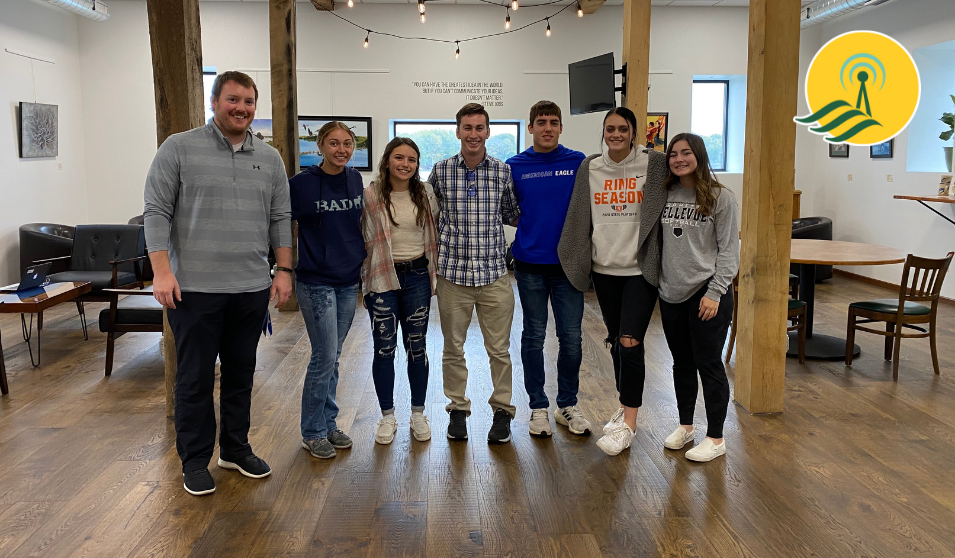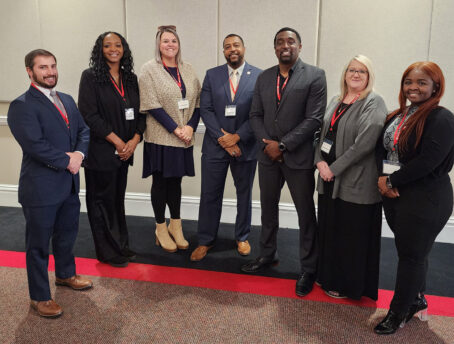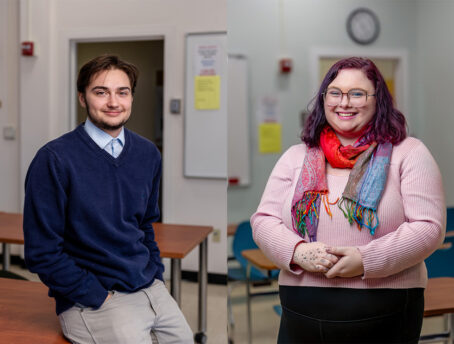Special thanks to Jason Neises, our Iowa Hub contact at Community Foundation of Greater Dubuque, for connecting us with Bellevue Schools, and to Tom Meyer, superintendent of Bellevue School District, for partnering with Rural Schools Collaborative on this story. Read more about Bellevue Schools and CFGD here.
Listen to the podcast here:
You can also find our podcast on Apple Podcasts, Stitcher, Google Podcasts and Spotify.
Written Version:
When faced with adversity, rural schools often turn to innovation as a way of not just rising above their challenges, but of defining an even higher path forward. Our Iowa Hub partners at the Community Foundation of Greater Dubuque have often worked with inspired schools doing this kind of transformational work, such as the Bellevue School District in Bellevue, Iowa.
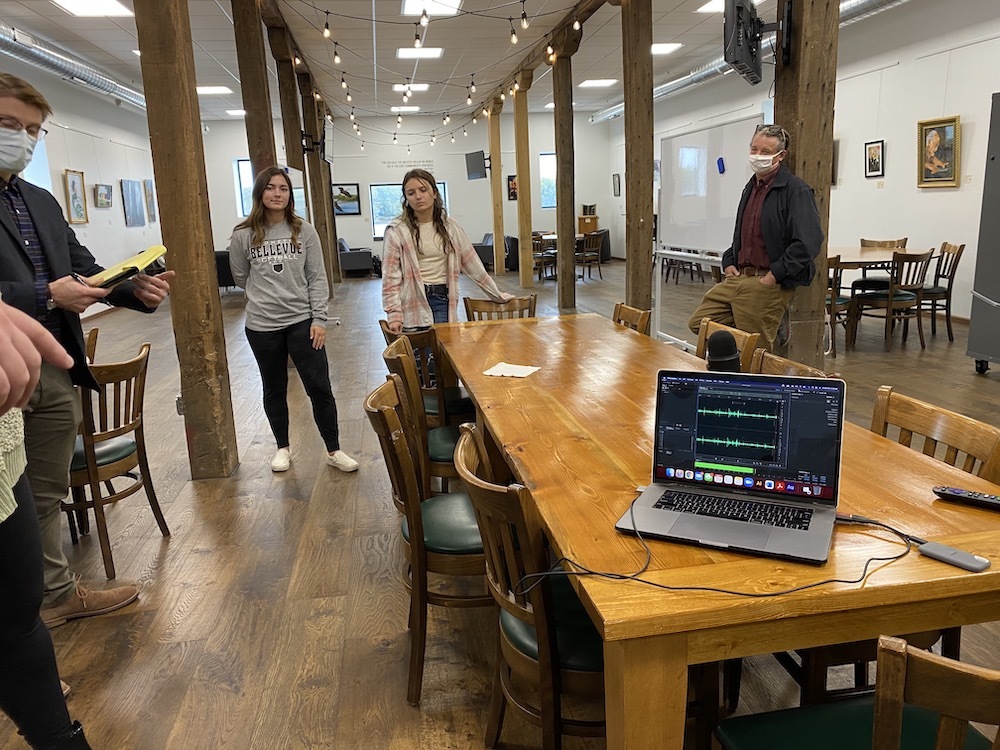
Wanting to see their work first-hand, the Rural Schools Collaborative team traveled to Bellevue and interviewed Matt Jaeger and his students. A high school social studies teacher and coach, Matt is the co-leader of the district’s innovative, student-led project-based learning site: Bellevue BIG. He shares in this episode how teachers eager to break the traditional mold find these student-led initiatives just as fulfilling and energizing for themselves as they do for students.
The RSC team joins Matt and his students in the beautiful, modern-industrial space that houses Bellevue Big. A massive reclaimed wood table anchors the space, and students kick back, resting their feet up on homemade resin coffee tables, overlooking the Mississippi River. With metal engraving machinery, various art projects on the walls, and spare parts of a pizza oven in progress, this creative space is a far departure from the traditional classroom.
John: So, how did you get involved in doing this? What was that process like?
Matt: When we started, I think it was an interest between...Tom, and then also Curt, myself. We've done some different things with service learning, we've done some different things looking at High Tech High out in San Diego, looking at Iowa BIG, and I think we wanted to find...not necessarily a new way but a different way to to get kids involved, whether it's a kid that's an A-B student or a kid that maybe struggles in school. And, kind of prove as well that there's different ways that people learn, there's different ways you can learn. You don't have to go sit in a classroom and do the...'read chapter two, take this test.' There's different ways we can do it...this is kind of a nice way to enhance your educational experiences. We kind of talk about this in the way of, like, scholarships and different things like that. Everybody's going to have somewhat good grades, good test scores. This is the kind of stuff that maybe separates you from the other kids, you know, or even if I don't have good grades and I don't have good test scores, but I can say, 'Hey, I led this project, involved the community, I had to communicate with people, I had deadlines, and all this stuff, and here's my end product,' it shows that you're capable of doing stuff. I think there's an interest from us just to try to do things differently and just kind of prove that you can do them differently, as well.
As part of the district’s efforts to give students autonomy, career skills, and leadership opportunities through community-focused projects, Bellevue BIG was established in a rehabilitated button factory on the banks of the Mississippi River in downtown Bellevue. Now grown to 25 students after a pilot group of just 6 a few years ago, Matt and his fellow “lead learner” Curt Ernst are redefining classroom roles, expanding the ways students can learn.
John: I'm curious, as a teacher in this space, how do you envision your role?
Matt: ...We don't know. [laughter] Year to year, we're not sure. We don't know what every day is going to bring. There's things out there, like aquaponics, I had no clue how that worked. None of us did. We're not sure how to do it, but we're willing to learn with them, as well. So...it's not really a boss role, but like a leader role like that where you're, 'Hey, let's sit down, let's figure this out, task it out, go from there.' It is unique. It is very different, you know. It's not the, 'We're gonna go this lesson, and then this lesson.'
Taylor: I'm curious...have you always been in rural areas, or were you kind of intentional about teaching in a rural place? Or did it just happen?
Matt: It happened. [laughter]…I grew up, born and raised in Dubuque, so...I'm still close really close to home. It was 2011, and it was the years after staffs were getting cut and things like that, and basically I threw out 30-something applications and this one stuck…I always thought I was going to end up going back to Dubuque, and I made a decision to stay here because I know in Dubuque I would have to fit into a cookie cutter model and do the same thing. Where here, I can look at what I do one day and totally change it the next day, or from year to year I can totally say, 'All right, clean slate, let's start over.' So I really enjoy that from this community. You know, I met my wife here, she's from here, born and raised, so I’m kind of stuck now. [laughs] …we're really excited about the changes that have been going on here. I think it's giving a younger generation some more things that they're excited about and wanting to do.
Bellevue BIG is definitely breaking the model of a traditional classroom. Rather than structured sections and chapter tests, Matt and Curt connect students with skills and tools needed to complete projects they design. One student, Riley, took an interest in crafting signs for area businesses
Riley: Curt went up, he taught me how to use the machine there, and we cut it out...and then, we also have a powder coating machine out at the high school. And so, basically you spray a powder on the metal piece, and throw it in the oven, and then it kind of makes the paint stick a little bit better.
Matt: They've had a couple different businesses ask for signs being done that way, so they basically kind of have a, 'Here's what the price would be...' and they have all those conversations…
Other students are passionate about enhancing the project space itself
Student: We decided to work on the basement and make that, like, almost like up here and have it all finished. But the main thing that we're starting with is a sound proof room for recording. So like, there's another group that has a podcast and that would work perfectly for a sound proof room for them.
Matt: ...It's these two and Saylor, and they're like, 'We want to do this, we want to hang drywall, we want to do all this work.' And so it's kind of a unique thing that way. I think it's an experience for them that they probably wouldn't necessarily get or put themselves into maybe normally either, so...they're gonna finish it...they're gonna start with the sound room, and then we're gonna kind of build around that, and then we have another group that's starting a podcast for down here that wants to share with the community what we're doing here…as much as you try to get stuff out there's still some people that will be, 'I've never heard of this before, I don't know what this is.'
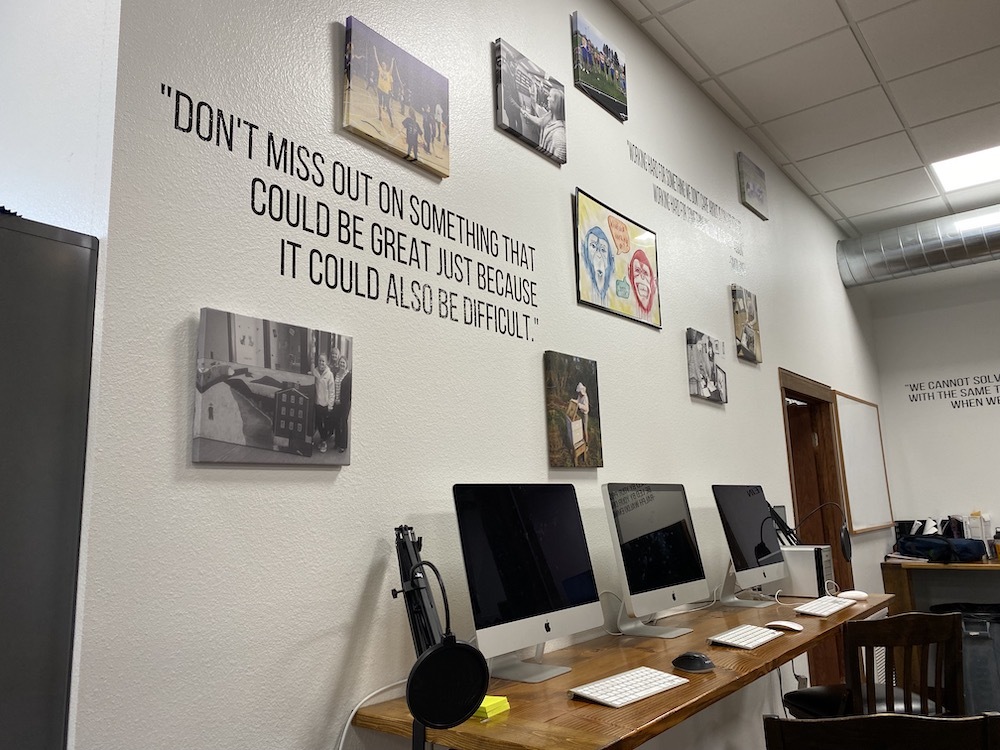
Along with chance to run their own project, students in the Bellevue BIG program enjoy the personal autonomy and freedom the space itself offers in the design process.
Student: It's, like, totally different down here, like...compared to the school, you come down here and you can just, like, almost, like, do your own thing the whole time, kind of? And, like, not have to worry about like what your teachers are thinking...
Riley: It's really just, like, a different environment down here. I mean, you get to think freely, especially, like, connect with what you're doing on your project, you know. Everybody's kind of thinking, you know, how can we make this part better?
Yet the program is such a departure from the traditional class environment, that it poses some challenges for teachers and students both.
Matt: Probably the biggest thing is time management...that these guys learn. Because we have a couple seniors that have a lot of stuff on their plates. We had one this year, I know, and it was kind of slipping on them at the beginning, and she wasn't getting stuff done, I was like, 'You gotta figure this out. You're gonna have this in life, where you got, "I gotta do this, this, this, this, and this." You gotta figure out your time, and figure out a way to get them done, or communicate with people what's going on.' So yeah, that's kind of a big thing I think they take away as well is that time management. Because they go off to college then, 'I got school, I got jobs, I got social life, how do I fit it all in?'
But as with any problem, challenges can easily become opportunities to advance further.
Taylor: I think that's so fabulous, I feel like those are real life skills to be kind of thrown into the fires, and so it's wonderful for kids to both feel like they have some autonomy and decisions about the work that they're doing but also really teaches them things that are useful outside of the classroom...
Matt: Yeah, and you know it's a good place to fail, I would say, you know. I mean...if you fail here, you're not really out anything. If you fail four years, five years from now, when you're starting a business, it's a little different situation for you…
Being rural adds another dimension to the factors Matt, Curt, and their students work with daily.
Matt: One of the biggest challenges that we have is we are a small, rural community, and the model that we want to present here, we want to be like Iowa BIG, we want to be like those situations, when you look at Iowa BIG and Cedar Rapids, is what Cedar Rapids has to offer and what we have to offer here are vastly different. So if you look at, like, connections with businesses, and things like that, they're not always as simple or as easy to get ahold of. We have a lot of unique situations where it ends up being, it's somebody's hobby, or something like that, and it becomes a connection that way, where we're able to build a professional connection that way. That's not always easy, where it's like, 'Oh, that business down the street, they do that, let's give them a call. There's five different options, let's see which one sticks for a business that we can do this with...' That's probably the biggest struggle is we don't have that same...ability to build relationships that way. Or, we can, and it's, 'Okay how's this gonna work? Because we built a relationship with a person in Preston, and it's 20 minutes away. How do we make sure this can work?' And things like that, as well, so...
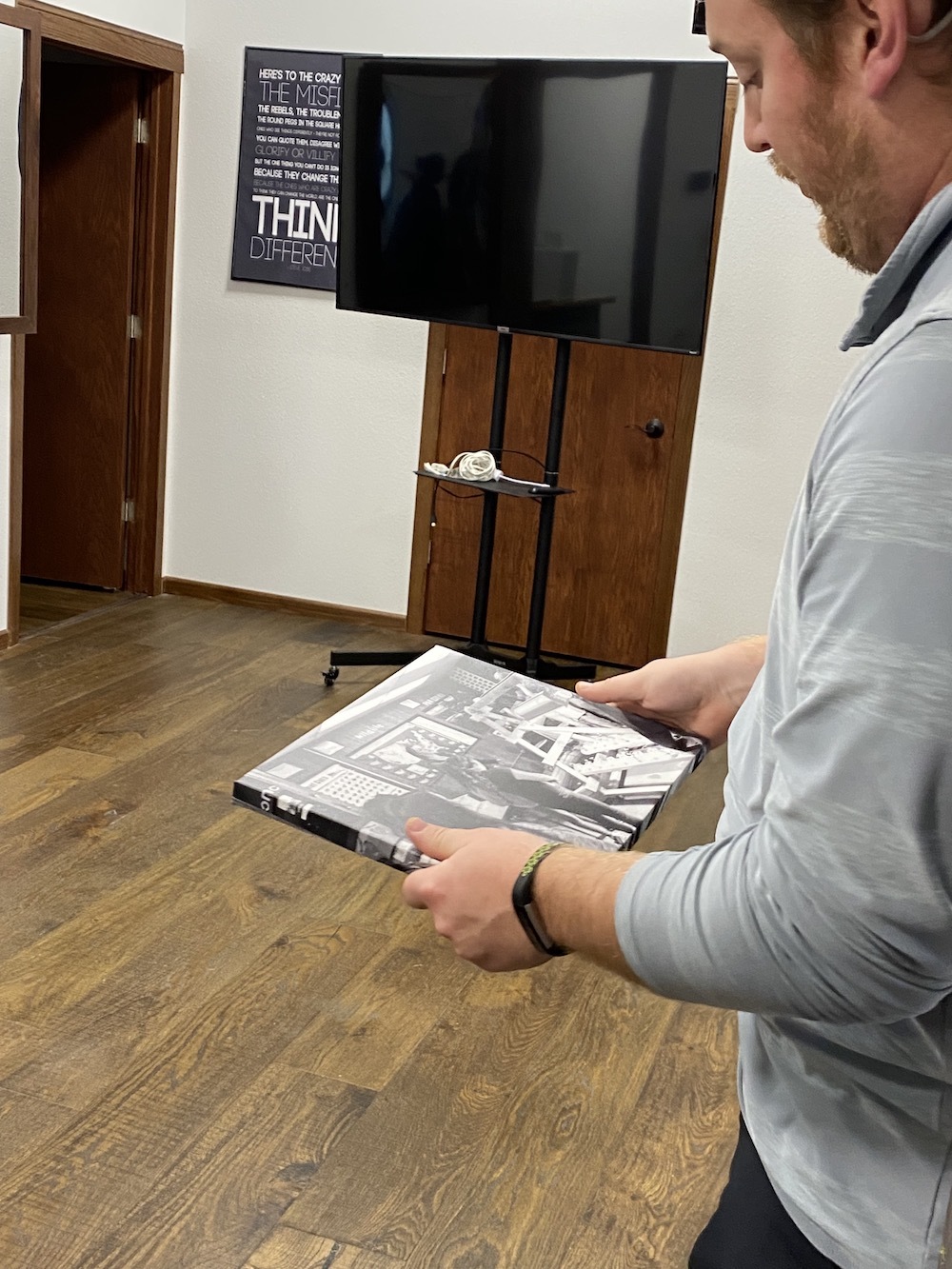
As RSC staff continued to tour Bellevue BIG, we were impressed by the innovation and creativity of the students’ projects to strengthen their hometown, so we were curious what other schools could learn from their progress.
Taylor: I feel like a lot of teachers or schools would be interested in doing something like this, but it can feel really intimidating on where to get started, so I'm curious...what type of advice would you give to a teacher or school that would like to start a program similar to this?
Matt: Similar to us, I would say, start small. Get three to four, you know, keep a single digit number of kids, and only have like one or two projects. And just kind of see where it goes from there, you know. I wouldn't tie any core standards or classes to it right away, it's just, 'Let's see what you can do.' Figure out some kind of elective credit for kids, make it some kind of 21st century skill type-deal, and just start playing with it.
Although Bellevue BIG is an active class space, Matt reminds us that it is also a community space, a place for students and the community to think and build together
Matt: Our doors are always open to have people come in and kind of see it and learn from us, as well...There's no perfect way to do it, either. You kind of have to look at your community as well, and what are the needs there? Even rural is unique in every way, what they have to offer.
Thank you for listening to this episode of the I Am A Rural Teacher Podcast. We’d like to thank our partners at the National Rural Education Association and the Community Foundation of Greater Dubuque for collaborating with us on this episode. The I Am a Rural Teacher campaign is made possible by a grant from The Bill & Melinda Gates Foundation.

